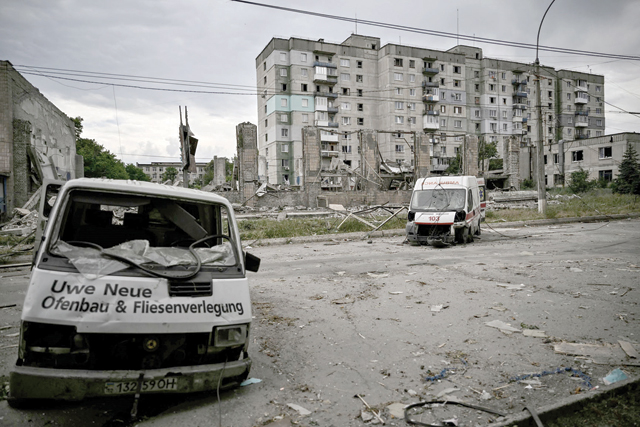KYIV, Ukraine — NATO's chief warned that the war in Ukraine could last "for years" as President Volodymyr Zelensky vowed on Sunday his forces would not give up the south of the country to Russia after he visited the frontline there.
Ukraine said it had also repulsed fresh attacks by Russian forces on the eastern front, rocked by weeks of fierce battles as Moscow tries to seize the industrial Donbas region.
While Ukraine remained defiant, NATO Secretary General Jens Stoltenberg urged Western countries must be ready to offer long-term military, political and economic support to Kyiv during a grinding war.
"We must be prepared for this to last for years," Stoltenberg told German daily newspaper Bild.
"We must not weaken in our support of Ukraine, even if the costs are high — not only in terms of military support but also because of rising energy and food prices."
British Prime Minister Boris Johnson issued a similar warning, urging sustained support for Kyiv or risk “the greatest victory for aggression” since World War II.
“Time is now the vital factor,” Johnson wrote in an article for The Sunday Times after making his second visit to Kyiv, calling for the West to ensure Ukraine has the “strategic endurance to survive and eventually prevail”.
Ukraine has repeatedly urged Western countries to step up their deliveries of arms since the February 24 invasion, despite Russian warnings that it could trigger wider conflict.
‘Mood is confident’
Zelensky made a rare trip outside Kyiv on Saturday to the hold-out Black Sea city of Mykolaiv, and visited troops nearby and in the neighbouring Odessa region for the first time since the Russian invasion.
“We will not give away the south to anyone, we will return everything that’s ours and the sea will be Ukrainian and safe,” he said in a video posted on Telegram as he made his way back to Kyiv.
He said he talked with troops and police during his visit.
“Their mood is confident, and looking into their eyes it is obvious that they all do not doubt our victory,” he said.
But Zelensky admitted that losses were “significant”, adding: “Many houses were destroyed, civilian logistics were disrupted, there are many social issues.”
Russia said on Sunday it launched missile strikes during the past 24 hours, including some targeting western-delivered weapons in Mykolaiv.
The strikes on a building in the city destroyed “ten 155 mm howitzers and around 20 armoured vehicles supplied by the West to the Kyiv regime over the last ten days”, the Russian defence ministry said.
There was no independent verification of the claims.
Mykolaiv is a key target for Russia as it lies on the way to the strategic port of Odessa.
With Russia maintaining a blockade of Odessa that has trapped grain supplies and is threatening a global food crisis, Odessa residents have turned their attention to rallying the home front effort.
“Every day, including the weekend, I come to make camouflage netting for the army,” said Natalia Pinchenkova, 49, behind a large Union flag, a show of thanks to Britain for its support for Ukraine.
‘Hero’
The Ukraine war is fuelling not only a global food crisis but an energy crisis too.
Germany on Sunday announced emergency measures including increased use of coal to ensure it meets its energy needs after a drop in supply of Russian gas.
Hit by punishing sanctions, Moscow has turned up the pressure on European economies by sharply reducing gas supplies, which has driven up energy prices.
Italian company Eni meanwhile joined a huge Qatari project to expand production from the world’s biggest natural gas field, days after Russia slashed supplies to Italy.
Back in Kyiv, thousands gathered to pay tribute to one young man — Roman Ratushny, a leading figure in Ukraine’s pro-European Maidan movement, who was killed fighting Russians in the country’s east earlier this month aged just 24.
In front of the coffin draped in a yellow and blue Ukrainian flag at the foot of a monument that overlooks the sprawling Independence Square in the capital, people of all ages saluted his memory.
“I think it is important to be here because he is a hero of Ukraine and we must remember him,” Dmytro Ostrovsky, a 17-year-old high school student, told AFP.
The loss put a human face on the shared grief of Ukrainians, as the bloodshed continues.
The worst of the fighting continues to be in the eastern industrial Donbas region, with battles raging in villages outside the city of Severodonetsk, which Russia has been trying to seize for weeks.
“There’s an expression: prepare for the worst and the best will come by itself,” the governor of the eastern Lugansk region, Sergiy Gaiday, told AFP in an interview from the Ukrainian-controlled city of Lysychansk across the river from Severodonetsk.
“Of course, we need to prepare,” he said, wearing a flak jacket and carrying gun cartridges and a tourniquet.
Ukraine’s armed forces said on Sunday they had pushed back Russian attacks on villages near Severodonetsk.
“Our units repulsed the assault in the area of Toshkivka,” the Ukrainian army said on Facebook, adding that Russian forces were also “storming” towards the village of Orikhove.
